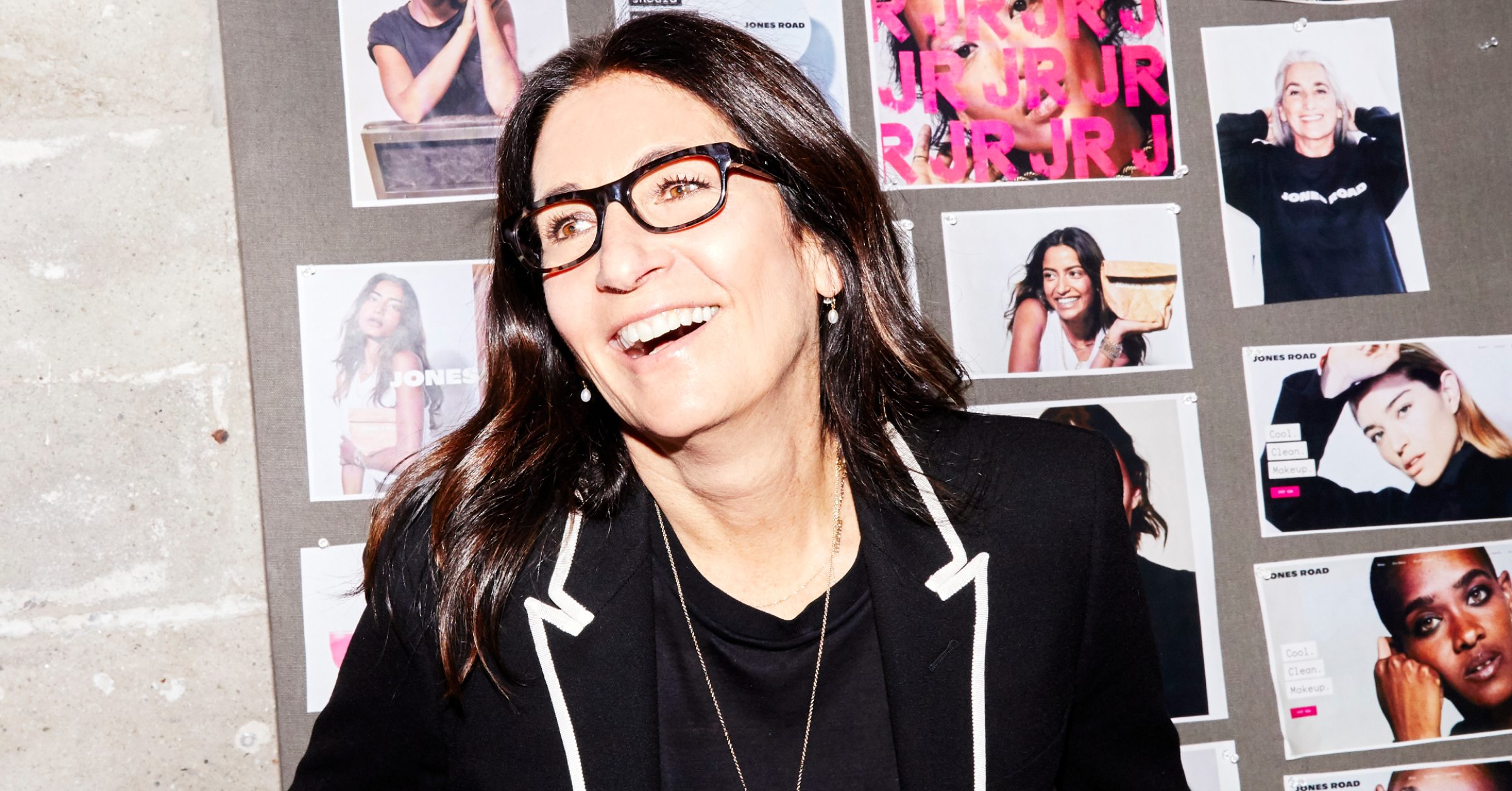If anyone knows about reinvention, it’s serial entrepreneur Bobbi Brown. After leaving her billion-dollar brand, Bobbi Brown Cosmetics, the world-renowned makeup artist faced a non-compete agreement that forbade her from starting a new cosmetics company — or even using her own name. Brown soon began a series of new ventures including a content site, a boutique hotel, and a podcast. But, on the day her non-compete expired, she launched Jones Road, a collection of clean beauty products for all ages, skin types, and skin tones.
In a Chief-exclusive conversation, Brown sat down with Chief Member Leigh Gilmore, General Manager for Live Journalism at Dow Jones, to talk about reinventing herself in her sixties, learning from her business failures, and staying true to her passion while rebuilding her career.
On Breaking Into the Beauty Industry
“As a young makeup artist, I moved to New York City in the middle of crazy makeup. I tried to do it, but I thought it looked bad. So, I started doing makeup in this very natural way, and I thought it looked great. Not everyone did, but a lot of people did. And that started my freelance career, and when I started Bobbi Brown Cosmetics, it was just because I discovered that I could make lipstick that actually looked like lips.
“Then, when I was starting out in corporate America, there were very few women. Mostly, there were men in suits with very strong opinions who sounded incredibly smart. But, what they were talking about made no sense to me. So I just said, ‘I don’t agree.’ And I found that some of the men really liked my opinion, and others really did not.
“I didn’t fight with [those who disagreed] because I didn’t have to. I learned a really valuable thing to say when there’s a difference of opinion: ‘I hear what you’re saying. Interesting idea.’ That doesn’t mean I’m going to do it, but there’s no reason to fight and say, ‘That is really stupid.’”
On Leaving Her Brand Without Losing Herself
“It took awhile to separate myself from the brand [Bobbi Brown Cosmetics]. I was fine with not having my name, which I couldn’t use and still can’t for any beauty purposes. I knew that when I sold the company, and I would not do anything differently today.
“But when I left Bobbi Brown Cosmetics, I had four and a half years left [on my non-compete agreement]. That’s a really long time for someone that doesn’t play golf or tennis, so I had to keep myself busy and understand that Bobbi Brown the brand is different from Bobbi Brown the person. Now, people are brands, they say. But I’ve reinvented myself in my sixties.”
On Launching Jones Road
“I launched Jones Road the day my non-compete was up. A lot of friends in the industry said the timing didn’t make any sense. There was too much going on. We were in the middle of the pandemic, social unrest, and the presidential election. People asked, ‘Why don’t you wait?’ I just didn’t want to wait. I didn’t think, ‘Well, is this the best time to do this?’ It was the best time for me.
“I was so excited going up to it. There were all these young kids around me, and everyone was as excited and energetic as me. No one was saying, ‘No, you can’t;’ everyone was saying, ‘Yes, yes, yes!’ And then, the night before I remember thinking: What if people don’t like it? What if people think it’s bad?
“Then, I launched it and instantly I was excited. I started reading comments on social media and it was so positive. And then, I just kind of knew that, ‘All right, I’m doing this.’ And the cool thing is that it reminds me so much of when I first started, when I didn’t know a lot but thought, ‘Wow, this would make sense. If I could show someone how great this looks and how easy it is, they’re going to want to buy it, and then they’re going to want to tell their friends and coworkers.’ That’s how I started and that’s how I think of Jones Road.”
On Going Viral in Her 60s
“It was such a surprise when I first went on TikTok, where I basically just said, ‘Hey guys, it’s Bobbi Brown. You probably know me as a makeup artist. What do you want to know?’ And we were bombarded with women saying, ‘Oh my God, you’re here! I’m 50. I’m 60. I’m 40. I’m 70. How do I do this? How do I do that?’ I started answering and it started going viral.
“It’s not like I was doing crazy things and trying to get attention. I was making how-to videos and women were loving it, and it kind of blew up from there. Whereas I think a lot of people and brands think too much. They study what everyone else is doing, and then try to do that instead of just what’s right for you, what is right for the brand, what is really putting the brand forward in the most authentic way.”
On Networking
“Number one, you have to get out of your bedroom [to build your network]. If you’re not someone that is going to chit-chat with other people, just start going to listen. There are so many opportunities and so many local opportunities. Go out there and maybe you will meet someone who might become a friend or have something you need.
“Be a sponge. I’d walk into these situations when I was a young makeup artist where there’d be an editor from British Vogue, an editor from France, a hairdresser from Australia, and I’d get little things from each of them. Whether that was how they dress or wear their hair and makeup, how they greet people, how they carry their bags. The more people you know and the more you get out there, the more interesting you are.
“And by the way, you could say, ‘I want to meet this person and get that,’ but it doesn't happen that way. People think of networking as having business cards and running around with a briefcase trying to get things. No, things are more organic and they happen naturally. You just have to be open, give off good vibes, and smile.”
On Learning From Failure
“Between Bobbi Brown Cosmetics and Jones Road, I had a wellness brand that launched in Walmart and direct-to-consumer. It was great, but it just didn’t do that well. I didn’t pay a lot of attention to it, which was probably one of the reasons it didn’t do as well, but I also think it was just not the right fit for me.
“What I learned is when to walk away, and to not feel that it was a failure. Yes, I could look at it as a failure, but I didn’t lose a ton of money. And more importantly, I learned something and brought that knowledge to Jones Road. I think the most important thing, if you’re doing something and it’s not working, is to think about when you should walk away.”
On Reimagining Your Career After 50
“Always be practical. Don’t just run away and start all over. What can you afford to do? If you can’t afford to leave your job, think about what you can do while you still have it to start the next chapter. Sometimes that’s just thinking and ideating, other times it’s reading and seeing what’s available.
“So that’s the first thing, and the second thing is to think about what you love. Think about what your passion is. My passion is beauty and makeup, there’s no question about that. So, what is your passion, and could you build a company around that?”



